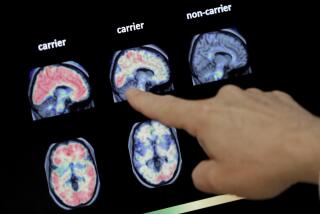Close Kinship Hikes Risk of Alzheimer’s Disease, Study Says
- Share via
Relatives of Alzheimer’s disease patients face an escalating chance of developing the condition as they age, and that likelihood rises markedly starting at age 75 and reaches 50% by age 90, a new study has found.
At age 65, such relatives have a 2.7% chance of developing the disease; by age 75, the risk increases to 14.6% and by age 86 to nearly 46%, according to the study. By 90, one of two Alzheimer’s patients’ blood relatives could statistically expect to develop the disorder.
The findings, which appear in this month’s issue of the Archives of General Psychiatry, apply to full-blooded brothers and sisters of Alzheimer’s victims as well as to victims’ children.
The calculations come amid a spate of recent research findings that are closing in on the specific genetic mechanisms that cause Alzheimer’s.
The authors of the study, from New York’s Mount Sinai School of Medicine and the Bronx Veterans Administration Hospital, said their findings buttress the growing consensus that Alzheimer’s has no environmental origin.
The disease afflicts between 1 million and 2.5 million older Americans, generally striking between ages 60 and 79. Its symptoms, which include progressive loss of memory, reason and ability to function, usually become advanced two or three years after onset.
The research team concluded that the new age-risk evidence implies that the suspected Alzheimer’s gene remains dormant until very late in life. If a technique can be developed to delay activation of the gene by even five years, researcher Dr. Richard Mohs suggested, 50% to 60% of cases might be avoided because potential patients would die of other causes first.
Other Alzheimer’s genetics experts urged caution in interpreting the new findings, however, both because the calculation of such high odds may unduly alarm some Alzheimer’s patients’ relatives and because physical and mental problems in extremely old people are so common that the New York researchers may not have taken into account the possible influence of non-Alzheimer’s aging symptoms.
The latest research was based on an analysis of the family health histories of 50 Alzheimer’s patients, compared with those of 45 people of similar age but free of Alzheimer’s.
The researchers relied on new Alzheimer’s diagnostic criteria promulgated by the National Institutes of Health. The standards were developed because Alzheimer’s previously could only be definitively diagnosed at autopsy.
Value Questioned
In a telephone interview, Mohs conceded that the new findings may be of comparatively little clinical value because there is no known way to prevent or delay the onset of Alzheimer’s.
He said relatives of patients should not be unduly alarmed because the greatest risk seems to occur at ages that are beyond the normal life expectancy for Americans--70 for men and 77 for women. A 70-year-old blood relative of an Alzheimer’s victim has a 6.6% chance of getting the disease, according to the new study, and a 77-year-old has between an 18% and 21% chance.
“We’re not saying that 50% of these relatives are going to get Alzheimer’s,” Mohs said. “Fifty percent would if they lived that long, but the fact is they won’t.”
The calculations--in theory, at least--also include parents as potential Alzheimer’s patients, were their offspring to develop the disease.
According to the team headed by Mohs and Dr. Kenneth Davis, environmental factors can be ruled out as a link in Alzheimer’s. Otherwise, they said, the risk of developing the disease would be more evenly spread among spouses in their study, for instance.
Dr. Lon White, an epidemiologist at the National Institute on Aging, said the premise of a genetic origin for Alzheimer’s is “really not new” and expressed concern that the quantification of risk “has scare built into it.”
‘A Grain of Salt’
“It’s a very useful sort of information,” he said, “but all of us in the field take this with a grain of salt.”
Dr. Leonard Heston, a University of Minnesota Alzheimer’s expert, said it may be risky to draw firm conclusions about risks in age groups beyond 75, because such people normally have a variety of physical and mental impairments that may make it difficult to separate the risk factors for Alzheimer’s.
“After age 80,” he said, “almost everyone you run into has some kind of chronic illness that can interfere with mental functioning. It’s hard to make a diagnosis.”






